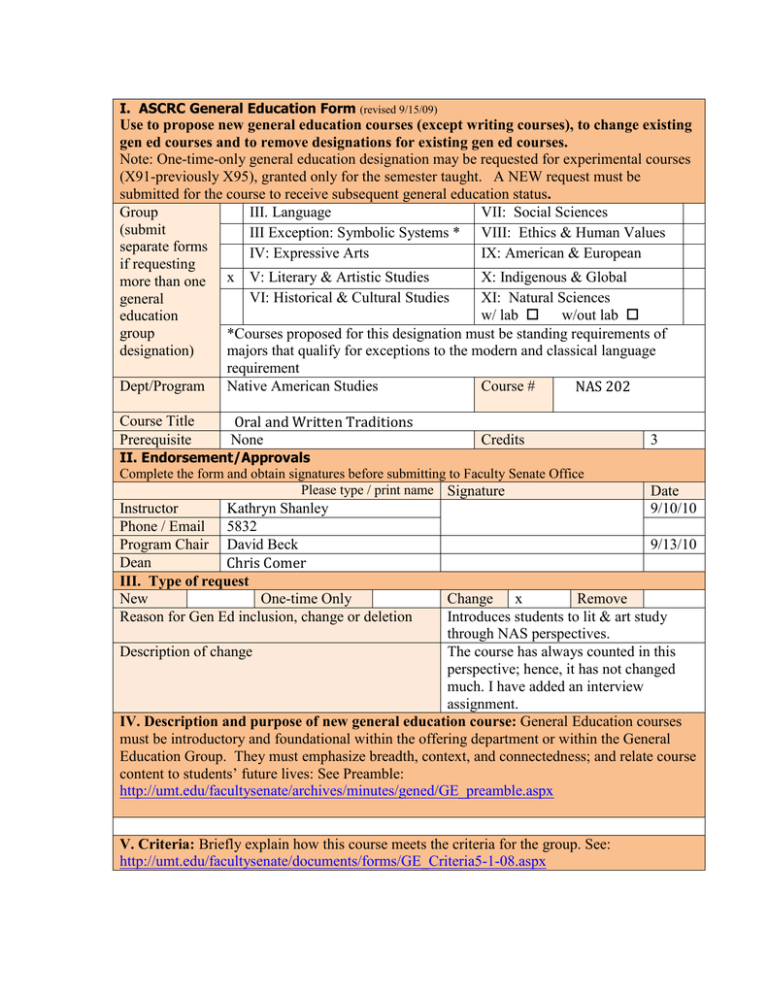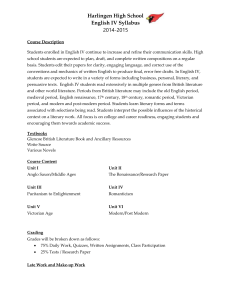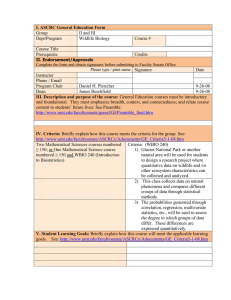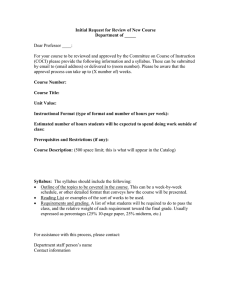Use to propose new general education courses (except writing courses),... gen ed courses and to remove designations for existing gen...
advertisement

I. ASCRC General Education Form (revised 9/15/09) Use to propose new general education courses (except writing courses), to change existing gen ed courses and to remove designations for existing gen ed courses. Note: One-time-only general education designation may be requested for experimental courses (X91-previously X95), granted only for the semester taught. A NEW request must be submitted for the course to receive subsequent general education status. Group III. Language VII: Social Sciences (submit III Exception: Symbolic Systems * VIII: Ethics & Human Values separate forms IV: Expressive Arts IX: American & European if requesting X: Indigenous & Global more than one x V: Literary & Artistic Studies VI: Historical & Cultural Studies XI: Natural Sciences general w/ lab w/out lab education group *Courses proposed for this designation must be standing requirements of designation) majors that qualify for exceptions to the modern and classical language requirement Dept/Program Native American Studies Course # NAS 202 Course Title Prerequisite Oral and Written Traditions None Credits II. Endorsement/Approvals Complete the form and obtain signatures before submitting to Faculty Senate Office Please type / print name Signature Instructor Kathryn Shanley Phone / Email 5832 Program Chair David Beck Dean Chris Comer III. Type of request New One-time Only Reason for Gen Ed inclusion, change or deletion 3 Date 9/10/10 9/13/10 Change x Remove Introduces students to lit & art study through NAS perspectives. Description of change The course has always counted in this perspective; hence, it has not changed much. I have added an interview assignment. IV. Description and purpose of new general education course: General Education courses must be introductory and foundational within the offering department or within the General Education Group. They must emphasize breadth, context, and connectedness; and relate course content to students’ future lives: See Preamble: http://umt.edu/facultysenate/archives/minutes/gened/GE_preamble.aspx V. Criteria: Briefly explain how this course meets the criteria for the group. See: http://umt.edu/facultysenate/documents/forms/GE_Criteria5-1-08.aspx Povides foundational knowledge Provides introductory knowledge of a range of tribal traditions and given a framework for understanding differences in Native American expressive arts and change as it evolves through the centuries. Offers students introductory knowledge to enhance skills in listening and public speaking; interpretation of both oral performance and written texts. Introducing genres related to oral expressive culture: oral performance, poetry, autobiog, storytelling, early short fiction. Students will work together in groups to interview people about intergenerational transmission of knowledge and values, then present their findings to the class. The rest of the class will critique the presentations. The professor will offer critiques of their writing and conferences with them on how to improve. VI. Student Learning Goals: Briefly explain how this course will meet the applicable learning goals. See: http://umt.edu/facultysenate/documents/forms/GE_Criteria5-1-08.aspx Upon completion of this perspective students This will be accomplished through the will be able to: following activities: 1. express themselves in the making of an original work or creative performance; 2. understand the genres and/or forms that have shaped the medium; and 3. critique the quality of their own work and that of others VII. Justification: Normally, general education courses will not carry pre-requisites, will carry at least 3 credits, and will be numbered at the 100-200 level. If the course has more than one pre-requisite, carries fewer than three credits, or is upper division (numbered above the 200 level), provide rationale for exception(s). 1. The initial writing assignment, in particular, encourages self-exploration and – express (autobiog); interviewing another and presenting findings orally foster creativity; 2. The students read three texts: myths and stories; a classic autobiog; an autobiog dealing with boarding school experience, and; other stories, fictional and autobiog, in addition to reading in class select poetry. 3. Students will critique the oral presentations with guidelines to foster increased understanding of oratory. Students will be required to revise one essay and the option of revising others. Introductory skill acquisition relative to proper form in writing & speaking are built into the course. No prerequisites. VIII. Syllabus: Paste syllabus below or attach and send digital copy with form. The syllabus should clearly describe how the above criteria are satisfied. For assistance on syllabus preparation see: http://teaching.berkeley.edu/bgd/syllabus.html : (See Attached) Please note: Approved general education changes will take effect next fall. General education instructors will be expected to provide sample assessment items and corresponding responses to the Assessment Advisory Committee. The class will be given a critique through the Pedagogy Project. NATIVE AMERICAN STUDIES 202.01 Oral and Written Traditions in Native America Fall 2010, TTh. 2:10 – 3:30 Professor: Kathryn Shanley Phone: 5832 Email: kathryn.shanley@umontana.edu appt. Office: NAC 203C Office Hrs: Weds. 2-4, Tues. 1-2, & by Catalog Description Analysis of oral traditions of Native Americans including a study of the literary works of leading American Indian writers. Course Description Within Native American communities, oral and literary expression takes a wide range of forms from naming stories to novels, from chants to poems, from jokes to cautionary tales, from tribal histories to cautionary tales, and from mythic narratives to personal autobiographies. In this course we will survey many different genres from numerous and diverse cultures, paying as close attention (as time will allow) to the historical specificity of the literature. Although our approach to the subject matter will come primarily from Native American perspectives—that is, voices from individuals from a Native American background—we will also touch upon Western theoretical approaches to the study of oral and written literatures. We will discuss how differing worldviews are preserved through oral and written literatures, looking closely at several Native American groups. Course Objectives To develop an understanding of and appreciation for types of Native American oral and early written literatures; To demonstrate an ability to identify tribally specific beliefs and practices as reflected in literature; To be able to identify the general characteristics of various tribal oral and written literary movements; To increase writing skills through writing, revising, and rewriting as well as through discussion of writing principles and writing exercises; To increase public speaking skills by presenting a paper based on research to the class, with visual, auditory, and other types of teaching aids, as appropriate; To learn some basic research skills, including interviewing skills; To function within a group to create a coherent presentation of research. Course Requirements Detailed descriptions of assignments will be given in handouts well ahead of their due dates. The descriptions below are intended to provide an overall framework for understanding the professor’s expectations of students. Assignment #1: Personal Oral History. First draft , 3-4 pp. worth 10%; rewrite/revision, increased to 5-6 pp., worth another 10%). (20% total). Details available in the handout. Assignment #2: (5 pp.) based on the readings from Karl Kroeber’s book. Essay will offer an analysis of one of the selections from the text. (20%). (Writing assignment sheet will be given out in class.) Assignment #3: Essay on Black Elk Speaks. (Writing assignment sheet will be given out in class.) (20%) Assignment #4: Group project and presentation. Your group will be asked to interview a person over 65, based on a set of questions handed out in class that focuses upon the oral experience carried by the individual and how it functions intergenerationally. An in-class presentation and a written paper (3-5 pp.), will be due at the time of the presentation. (20%) (Writing assignment sheet will be given out in class.) Assignment #5: a literary analysis essay on The Middle Five. (20%), based on focused topics given out ahead of time. In class, we will discuss the dynamics of writing a literary analysis essay and the particulars of this assignment. All assignments will be evaluated on both writing and content. All papers must be typed, in 12 font, double-spaced and identified by your name, student ID. number, phone number and/or email address. Throughout the term, we will discuss the principles of good writing. Extra credit assignments. From time to time, students will be offered extra-credit options for listening to visiting speakers to UM campus. For full credit, students must write a two-page response paper, with an opening paragraph that presents the central idea of the lecture. That paragraph must contain a strong thesis statement on the student’s position on something the speaker has discussed. For example, if a speaker were to discuss perspectives on living in harmony with the environment, the student might decide to talk about two contemporary living challenges that threaten ways of life connected to the “natural” world, careful to avoid stereotypes. Keep up with the readings. The due dates of the reading assignments are indicated on the syllabus; they are due to be read in class on those particular days. Grading system: A = 4.00 A- = 3.67 B+ = 3.33 B = 3.00 B- =2.67 C+ =2.33 C =2.00 C- =1.67 D+ = 1.33 D = 1.00 D- = 0.67 F = 0.00 Attendance is required. If at all possible, please notify me in advance when you will be absent. I am easiest to reach by email, but my office phone works as well. Excessive absences (more than three classes per term) may result in your grade being lowered. Students who miss more than six classes will be asked to consider dropping the course. The purpose of required attendance is to assure that we function as a learning community, in conversation with one another about the subject matter. When a student misses too many classes, for whatever reason, he or she misses a significant amount of material. Participation Contributions to class discussion and overall good class citizenship—good attendance, turning in papers on time, being on time for class—may result in an increase in your grade. Late work is subject to a grade penalty of up to one letter grade per week on the particular assignment, but it’s always best to turn something in rather than not doing so. Pop quizzes will be given unannounced if I feel you are not keeping up with your reading. Out of respect for the professor and your classmates, I ask that you not leave class early unless you have a compelling reason, such as a doctor’s appointment, and that you do not otherwise disrupt class by coming and going, early, late or in the middle of class. If you have a child care problem one day and your child is of the age where he or she can sit and draw quietly, please feel free to bring him/her to class. Quiet babies are also welcome. No iPods in class, and please turn off your cell. If an emergency arises in your need to listen for buzz alert of a message, I will understand. If you have special needs of which I should be aware, please do not hesitate to speak with me. Special needs may include differences in learning styles or even shyness in a classroom setting, as well as physical disabilities, but are not limited to those things. Please let me know at the beginning of the term what your special needs you may have and what I can do to help you. If you are registered with Disability Student Services, please let me know at the beginning of the term, so that I can assist you in whatever ways I can to ensure your success. Please note: The Native American Studies Department does not allow courses to be offered on a pass/no pass basis. Incompletes and Student Conduct Code Please see the student handbook for information on incompletes and drops. Because most students do not finish incompletes, which then causes the incomplete to turn into an F, I prefer to work very closely with you when you are first having difficulty keeping up with the work. Both copyright laws and University policies are rigid regarding plagiarism—“the representing of another’s work as one’s own.” Please consult the “Academic Policies and Procedures” section of the current University catalog for details regarding penalties for plagiarism. Plagiarism is further defined as using another’s words or ideas (outside of common knowledge) directly or indirectly without citing them. It is still shocking, but students waste their own education and my time by plagiarizing off the Internet. If they can find it online, so can I, and I have no mercy on academic deception. Consequences of plagiarism can range from ostracism to rehabilitation training to zero credit to being dropped from the class to being dropped from the University. Please take this warning seriously. Departmental Assessment: The NAS Department¹s ongoing process of assessing its curriculum requires professors to read student papers to learn how students in general are progressing through the program. Thus your professor may choose a copy of one of your papers or ask for an electronic version of it to use in this assessment process. All identifying information will be removed and no evaluation of student work outside the boundaries of the course will play any role in determining a student’s grade. Required Books Kroeber, Karl, editor. Native American Storytelling: A Reader of Myths and Legends. Malden, MA: Blackwell. LaFlesche, Francis. The Middle Five. Lincoln: University of Nebraska Press, 1963. Neihardt, John G., Editor. Black Elk Speaks: Lincoln: University of Nebraska Press From time to time, I will put articles up on eRes (password 202)to complement the readings and discussions. Some required poems and short pieces with also be made available; for example, we will be reading a range of boarding school narratives and poems. I will alert you to these in class. Check with your classmates when you have been absent. Tentative Syllabus Week One: August 31 & September 2. Introduction T: Introduction to the class & each other. TH: Kroeber, “To the Reader,” 1-13. Week Two: September 7 & 9. Reading Oral Literature (September 6th, Labor Day) T: Kroeber, “Tewa,” 14-17; “Kalispell,” 18-20; “Kathlamet,” 21-24 TH: Kroeber, “Tillamook,” 25-38; “Sioux,” 39-44. (Assignment #1) Week Three: September 14 & 16. T: “Origins,” 45-6; “Cherokee (A),” 47-8; “Gros Ventre,” 49-51; “Cherokee (B),” 52-59. TH: “Seneca (A),” 60-3; “Seneca (B),” 64-66; “Eskimo,” 67-71; “Cherokee (C),” 72-74. Week Four: September 21 & 23. T: Black Elk Speaks, “Prefaces, xvii-xxviii; 1-16 (Assignment #2 due) TH: Black Elk Speaks, 17-59 Week Five: September 28 & 30. T: Black Elk Speaks, 61-102 TH: Black Elk Speaks, 103-154 Week Six: October 5 & 7. T: Black Elk Speaks, 155-184 Th: DVD—to be announced Week Seven: October 12 & 14. T: Introduction to Trickster philosophy (Assignment #3 due) Th: Elder Interview group time—no class. Week Eight: October 19 & 21. T: Kroeber, Trickster tales, TH: Kroeber, Trickster tales, Week Nine: October 26 & 28. T: TH: Boarding School narratives—introduction to the autobiography genre Day of Dialogue—no class. Week Ten: November 2 & 4. T: Election Day (no class) Th: Elder Interview group time—no class. Week Eleven: November 9 & 11. T: Th: LaFlesche, The Middle Five Veterans Day—No class Week Twelve: November 16 & 18. T: TH: LaFlesche, The Middle Five Elder Interview presentations—Groups 1 & 2 (1/2 hr. each) (Assignment #4 due)i Week Fourteen: November 23 & 25. T: Elder Interview presentations—Groups 3 & 4 (1/2 hr. each) TH: Thanksgiving! Travel safely. Week Fifteen: November 30 & December 2. T: Elder Interview presentations—Group 5 (1/2 hr. each) TH: Short stories from The Singing Spirit Week Sixteen: December 7 & 9: T: Contemporary poems (Assignment #5 due) TH: Last day of class Week Seventeen: December 14-18, Finals Week






